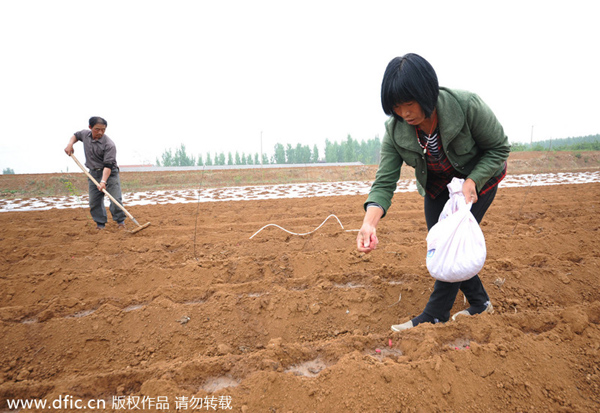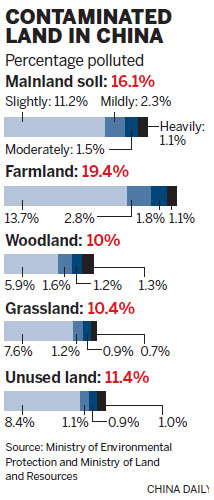Quality of arable land 'worrying'
By Wu Wencong (China Daily) Updated: 2014-04-18 01:51
 |
|
Shanghai villagers sow peanut seeds in Zaozhuang, East China's Shandong province on April 17, 2014. [Photo/icpress.cn] |
Many soil samples in study have excessive levels of pollution

Pollutants in more than 16 percent of Chinese soil exceed national standards, an official report said on Thursday.
For arable land, the figure rises to almost 20 percent, said the report issued by the Ministry of Environmental Protection and the Ministry of Land and Resources.
Officials and experts described the results as "not optimistic", as the quality of arable land is worrying and deserted industrial land suffers from serious problems.
The report, which was carried out from April 2005 to December 2013, covered about 6.3 million square kilometers.
Around 100,000 samples covered all arable land, part of the woodland, grassland and construction land in China.
Pollutants included 13 types of inorganic pollutants, mainly heavy metals, and three types of organic pollutants.
All may affect the production and quality of crops and are hazardous to human health.
Almost 70 percent of the contaminated samples are "slightly polluted", meaning that pollutants in the samples exceed the standard by up to two times. About 7 percent are "heavily polluted", which is more than five times the standard, the report said.
Chen Tongbin, a senior expert on soil pollution who participated in the investigation, said: "Unlike airborne pollution and water pollution, pollutants in soil spreads unevenly, even in a restricted area, so if the area represented by a sample is so big, we cannot say that the sample shows pollution of this area without further investigation."
Each sample represents an area of 64 sq km in this investigation, larger than the size of Manhattan, said Chen, a researcher at the Institute of Geographic Sciences and Natural Resources Research affiliated to the Chinese Academy of Sciences.
But Wang Shiyuan, vice-minister of land and resources, revealed during a news conference on Dec 30 that the area of contaminated arable land in China is around 3.33 million hectares, almost the size of Belgium.
Wang cited the figure from results of a national land survey conducted by the Environment Protection Ministry. But that figure did not appear in the newly released report.
The report shows that polluted farmland is concentrated along the developed eastern coast, the Pearl River Delta, and the northeastern industrial belt. Pollution by heavy metals is particularly severe in the southwest.
Compared with research by the Environmental Protection Ministry in the 1970s, the concentration of cadmium in soil all over the country has increased — by more than 50 percent in the southwest and areas along the coast, and by 10 to 40 percent in western, north and northeast China, the report said.
Chen said excess pollutants in soil do not always mean pollution. For some regions such as southwest China, where non-ferrous mineral resources are rich, the natural presence of heavy metal is much higher than in the other areas.
But in more cases, the excess is caused by pollution.
The tainted land may affect the production and quality of crops, and may also contaminate rivers and groundwater, said Wang Qi, head of the Institute of Environmental Engineering Technology at the Chinese Research Academy of Environmental Sciences.
To get rid of the heavy metals in arable land, he said there are mainly two ways, which require time and money.
One is to keep the heavy metals in the soil and prevent them from entering the crops, another is to use certain types of plants that will absorb most of the heavy metals.
"Solving soil pollution is extremely hard because it is invisible and requires higher costs," Wang Qi said.
- More female officials caught in corruption
- Whampoa veterans recorded with glory
- Police bust 9 terrorist groups in Xinjiang
- Knife-wielding attackers seized in Xinjiang
- New regulation leads to drop in petitioned cases
- Hunan plant shut as probe into lead poisoning begins
- Police boost efforts to combat gambling
- Project offers jobs openings to legal experts
- Experts: Dog meat festival 'illegal'
- Nation looks to upgrade
pipeline networks






